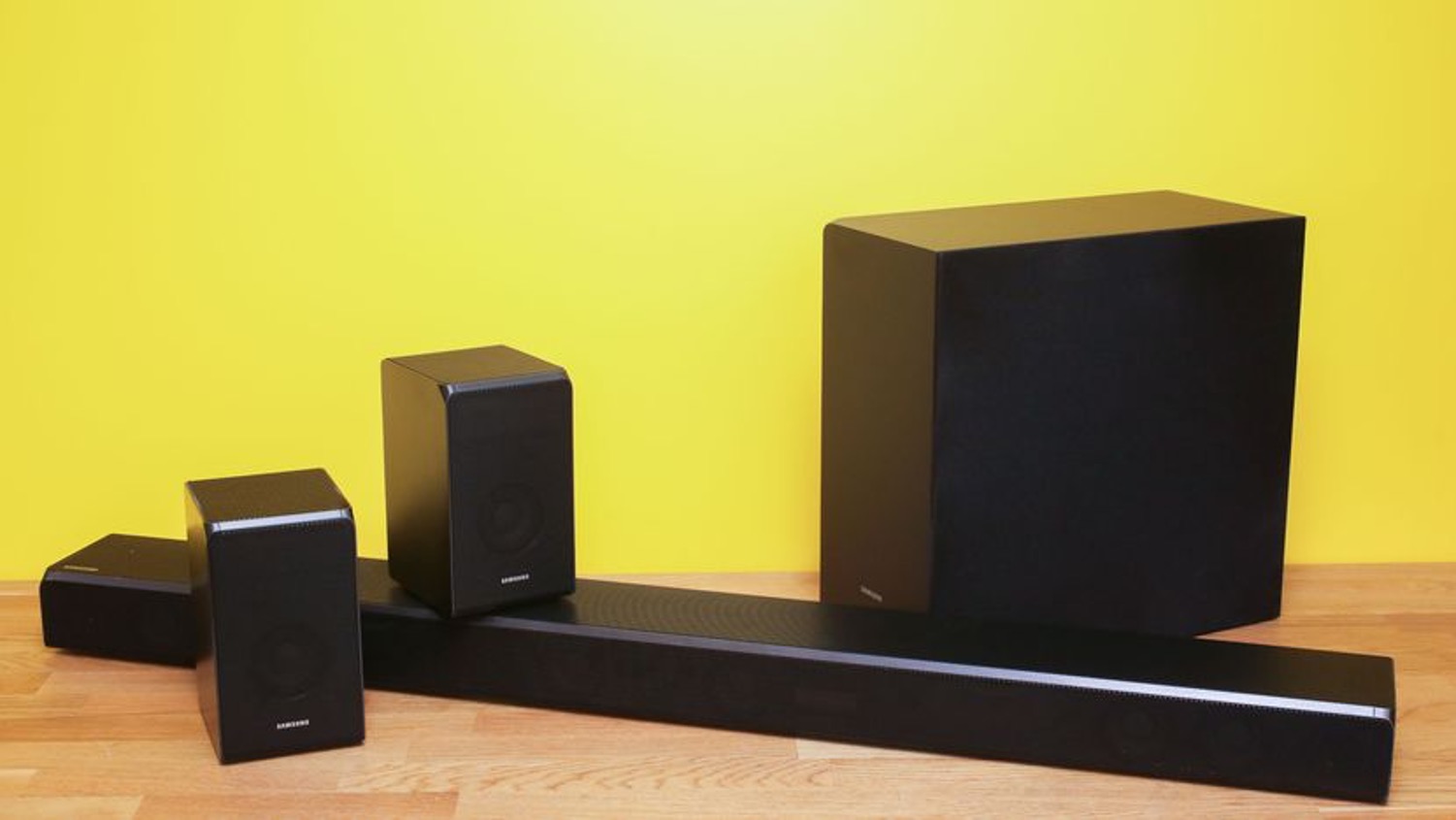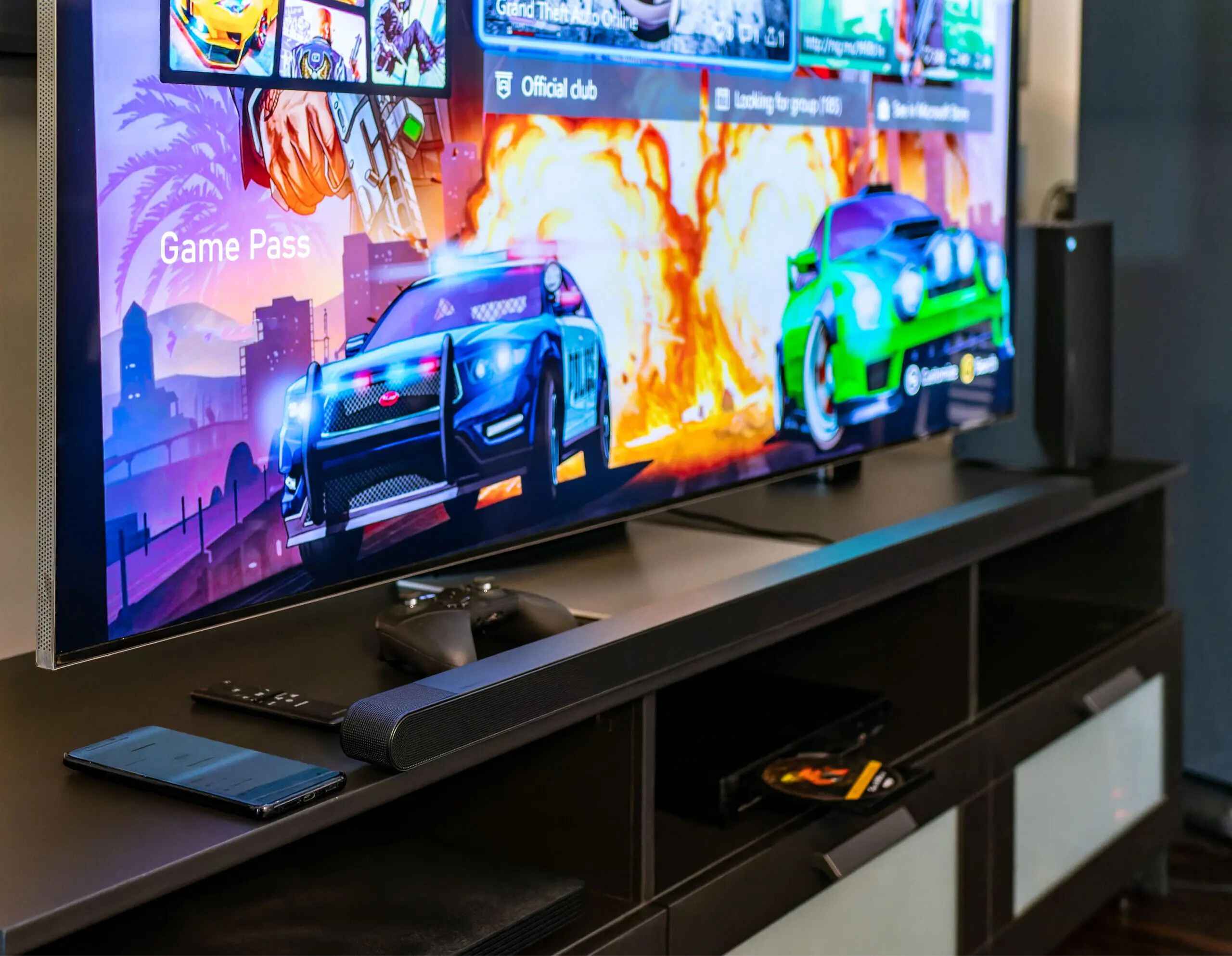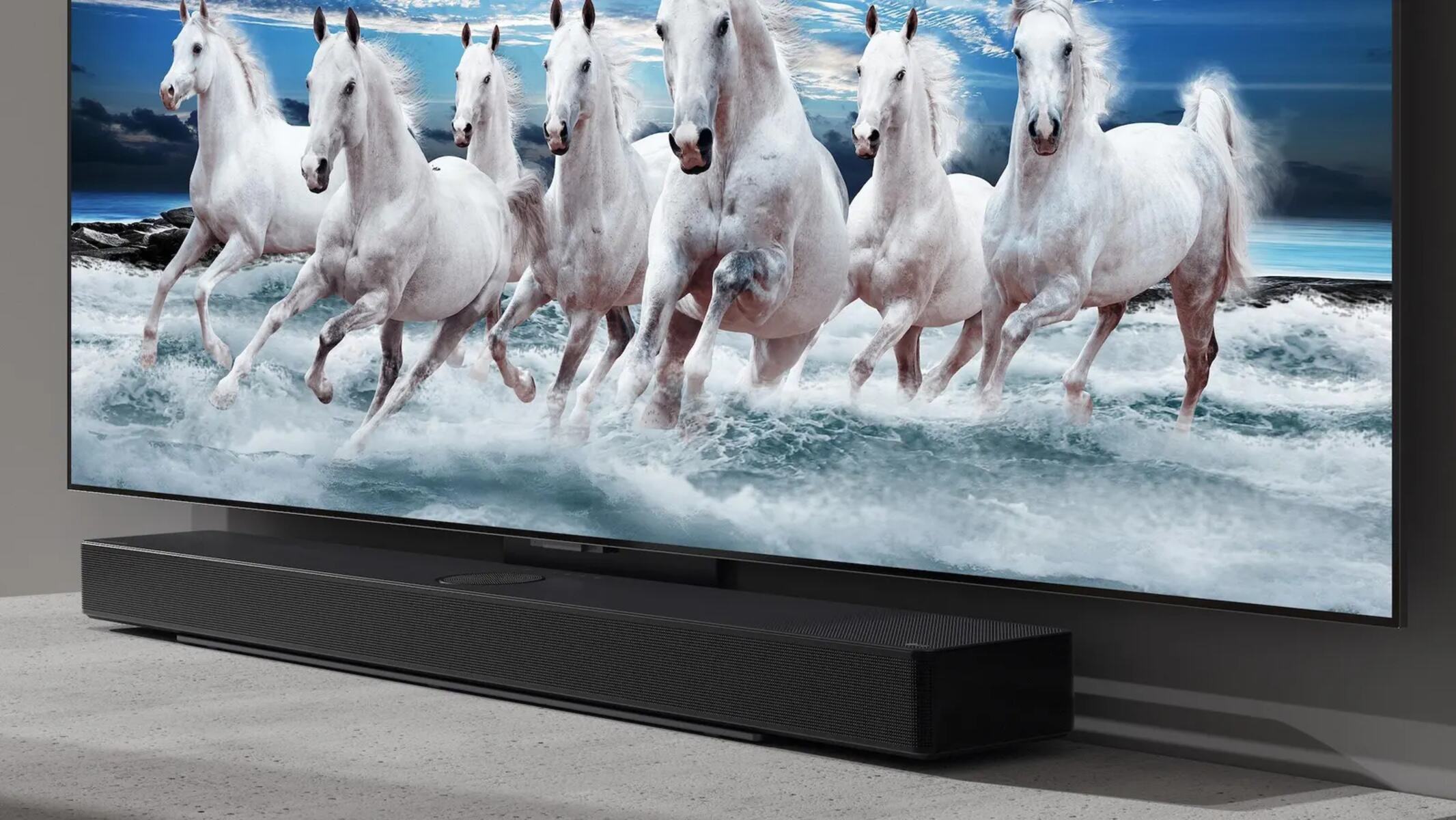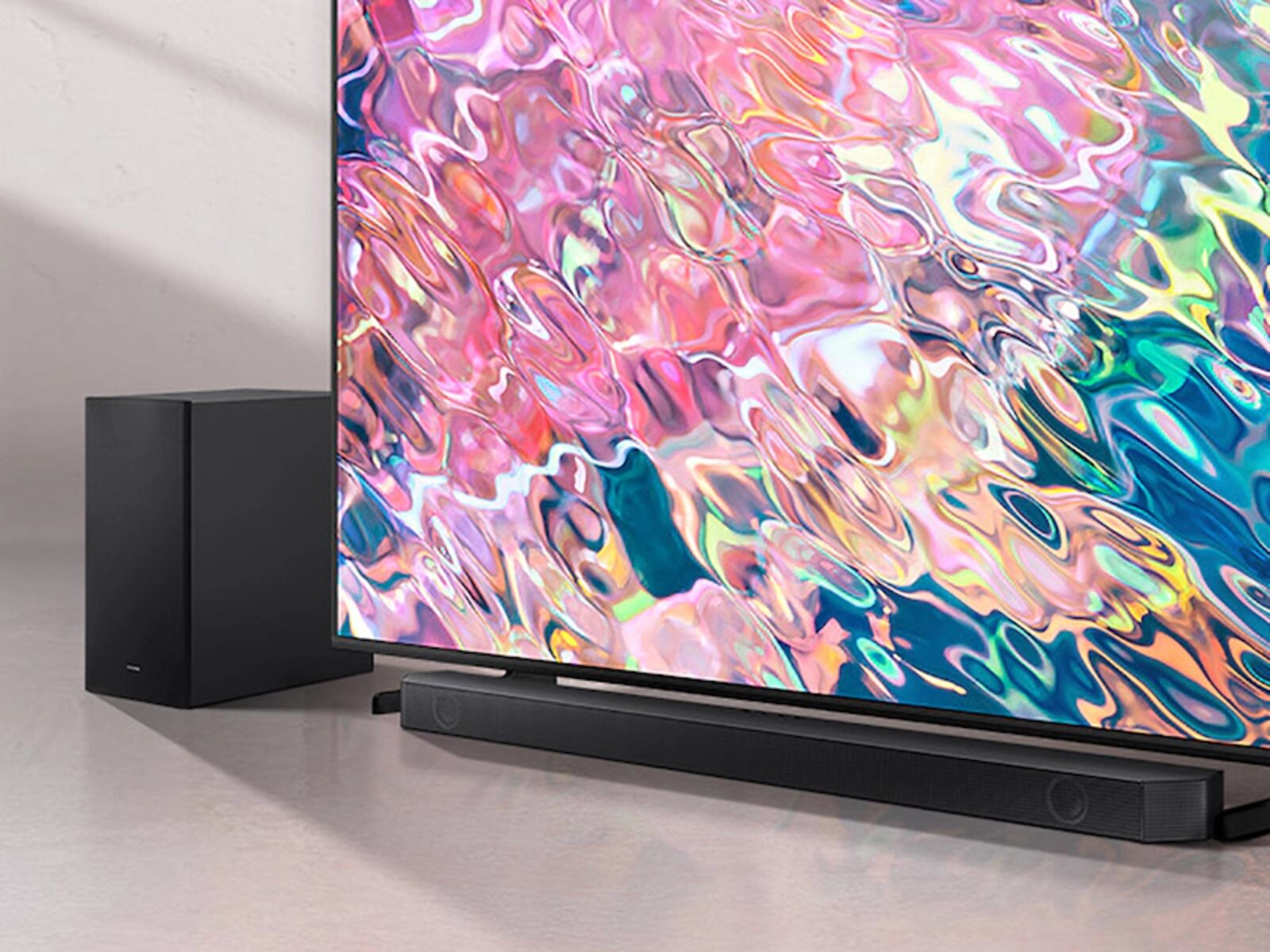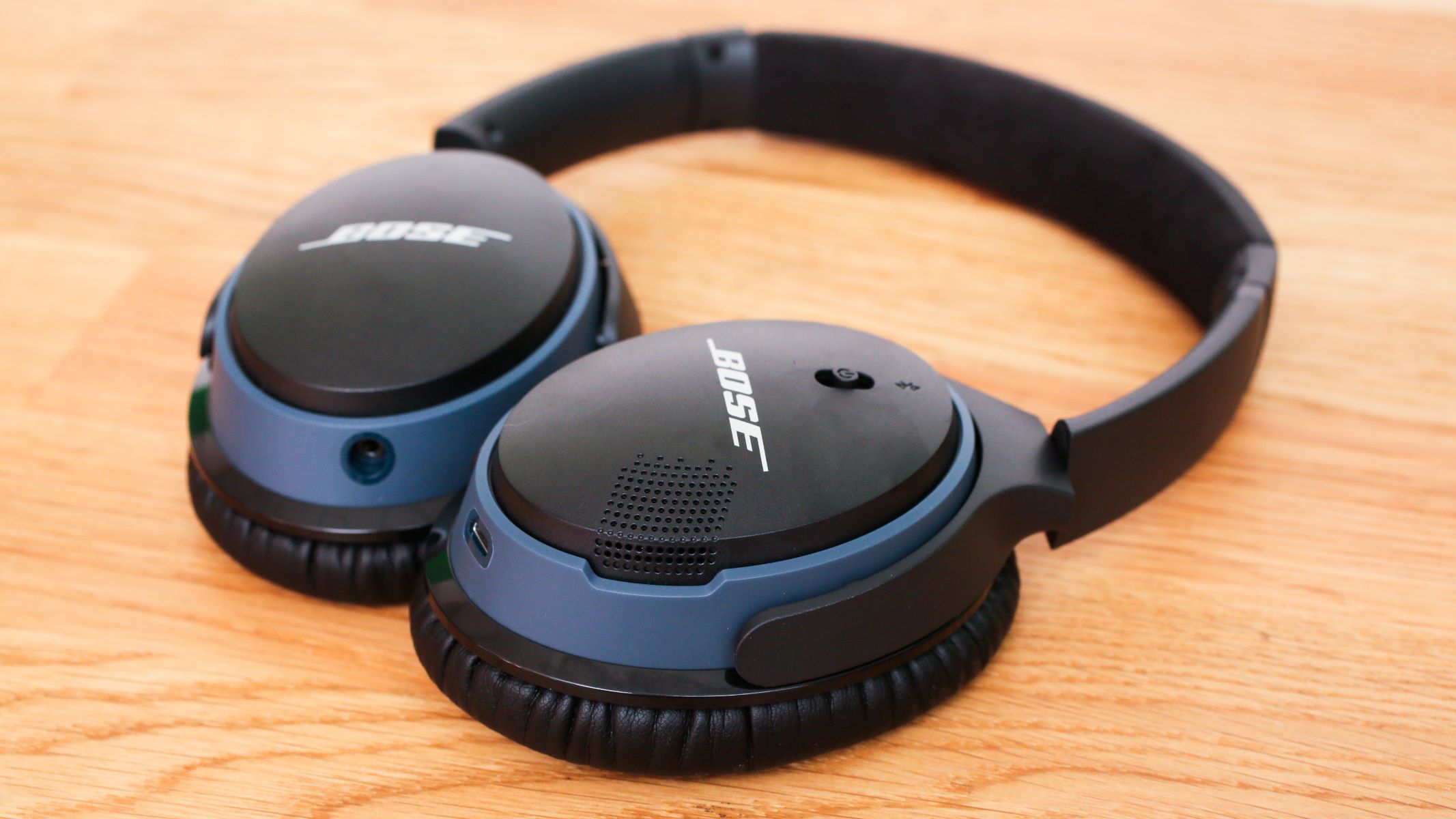Introduction
When it comes to enhancing your audio experience, a Samsung soundbar can be a fantastic addition to your home entertainment setup. With its sleek design and advanced audio technologies, it’s no wonder why so many people choose Samsung soundbars for their audio needs.
However, you may have encountered the frustrating issue of your Samsung soundbar sounding muffled. This can greatly diminish the immersive experience you expect from your soundbar. So, why does this happen? And more importantly, what can you do to fix it?
In this article, we will delve into the common reasons behind a muffled sound from your Samsung soundbar and provide you with troubleshooting steps to resolve the issue. Whether you recently purchased a Samsung soundbar or have been using one for a while, understanding the potential causes of muffled sound can help you enjoy crystal-clear audio once again.
Before we dive into the solutions, let’s take a moment to understand the basics of soundbars and how they work.
Understanding Soundbars
Soundbars have gained immense popularity in recent years due to their ability to enhance the audio quality of TVs and create an immersive home theater experience. These compact speaker systems are designed to deliver high-quality sound without the need for multiple speakers and complicated wiring.
A traditional TV setup often relies on built-in speakers that may produce mediocre sound quality. On the other hand, soundbars are specifically designed to improve audio performance by providing clearer dialogues, enhanced bass, and a wider soundstage.
Most soundbars feature multiple speakers within a single enclosure, including woofers for low-frequency sounds and tweeters for high-frequency sounds. These speakers work in tandem to deliver a well-balanced and immersive audio experience.
Furthermore, soundbars often come with various audio technologies and features to optimize sound output. These may include built-in digital signal processing (DSP) technology, Dolby Atmos support, and wireless connectivity options.
When it comes to soundbars, Samsung is a trusted brand that offers a wide range of models to cater to different audio preferences and budgets. Samsung soundbars are known for their sleek design, ease of use, and advanced audio technologies.
Now that we have a better understanding of soundbars, let’s explore some of the possible reasons for your Samsung soundbar sounding muffled.
Possible Reasons for Muffled Sound
If you notice that your Samsung soundbar is producing muffled or distorted sound, there are several potential reasons behind this issue. Understanding these reasons can help you troubleshoot and resolve the problem effectively.
- Placement of the Soundbar: The placement of your soundbar can significantly impact the sound quality. If your soundbar is obstructed or positioned too close to a wall or other objects, it may result in muffled sound. The sound waves need space to disperse and bounce off the walls, so ensure that the soundbar is placed in an open area with sufficient clearance.
- Blocked Speakers or Grills: Sometimes, dust, debris, or even accidental placement of objects can block the speakers or grills of your soundbar. This can hinder the proper propagation of sound and lead to muffled audio. Check for any potential blockages and ensure that the speaker grills are clean and free from obstructions.
- Incorrect Audio Settings: Your soundbar may have specific audio settings that need to be configured correctly for optimal sound. If the EQ (equalizer) settings are not properly adjusted or if certain sound modes are enabled, it can result in muffled or distorted sound. Make sure to review the settings and adjust them accordingly.
- Limited Audio Sources: The audio quality of your soundbar can also be affected by the source of the content you are playing. If you are streaming low-quality audio files or if the audio source itself is of poor quality, it can lead to inferior sound reproduction. Consider upgrading the audio sources to higher quality or using external devices like Blu-ray players or media streamers for better audio performance.
These are some of the potential reasons for a muffled sound from your Samsung soundbar. In the next section, we will discuss troubleshooting steps to help you fix this issue and restore the audio quality.
Placement of the Soundbar
The placement of your Samsung soundbar plays a crucial role in the quality of sound it produces. If your soundbar is positioned incorrectly, it can result in muffled or distorted audio. Here are a few key factors to consider when it comes to the placement of your soundbar:
- Clearance: Ensure that your soundbar has sufficient space around it for optimal sound dispersion. Placing it too close to a wall or other objects can cause the sound waves to bounce back and interfere with the audio quality. Aim for at least a few inches of clearance on all sides of the soundbar.
- Centered alignment: For the best sound experience, try to position your soundbar in the center of your entertainment setup. This ensures that the sound is evenly distributed and provides a more immersive audio experience. If your TV is mounted on a wall, consider mounting the soundbar just below it for optimal alignment.
- Elevated position: If possible, elevate your soundbar to ear level. Placing it on a shelf or mounting it on the wall at an appropriate height can improve the sound projection and clarity. By aligning the soundbar with your ears, you can create a more natural listening experience.
- Avoid obstructions: Keep the area around the soundbar free from obstructions. Objects like decorative items, plants, or furniture can impede the sound waves, resulting in muffled audio. Ensure that the soundbar and its speakers are not blocked in any way to allow for unobstructed sound projection.
By considering these placement guidelines, you can optimize the sound quality of your Samsung soundbar and minimize any audio distortions or muffled sounds. However, if adjusting the placement does not resolve the issue, there may be other factors contributing to the problem. Let’s move on to the next section to explore possible blockages that could affect the soundbar’s performance.
Blocked Speakers or Grills
If you’re experiencing muffled sound from your Samsung soundbar, one possible cause could be blocked speakers or grills. Over time, dust, debris, or even accidental placement of objects can obstruct the soundbar’s speakers or grills, affecting the quality of sound produced. Here are some steps to check for and remove any blockages:
- Inspect the speakers: Carefully examine the front and sides of your soundbar to visually check for any visible obstructions. Look for objects such as papers, remote controls, or any other items that might be blocking the speakers or grills.
- Clean the grills: If you notice dust or debris accumulated on the speaker grills, gently clean them using a soft cloth or a small brush. This helps to prevent any muffling or distortion caused by blockages in the soundbar’s audio output.
- Access hard-to-reach areas: Some soundbars have speaker grills that are not easily accessible for cleaning. In such cases, refer to the user manual to find out the recommended method for cleaning the soundbar’s speakers or grills. Using compressed air or a can of air duster can help remove any dirt or debris from hard-to-reach areas.
- Prevent future blockages: To avoid future blockages, consider placing the soundbar in an open area away from objects that could obstruct the sound. Also, make it a habit to clean the speakers and grills of your soundbar regularly to maintain optimal audio performance.
By ensuring that the speakers and grills of your Samsung soundbar are free from blockages, you can promote clear sound reproduction and reduce any muffled audio. If, however, removing blockages does not resolve the issue, there may be other factors affecting the sound quality. In the next section, we will explore the possibility of incorrect audio settings causing muffled sound.
Incorrect Audio Settings
Incorrect audio settings can also contribute to a muffled sound from your Samsung soundbar. If the equalizer settings or sound modes are not properly configured, it can affect the clarity and balance of the audio. Here are some steps to check and adjust the audio settings:
- Equalizer settings: Most soundbars offer equalizer settings that allow you to adjust the bass, treble, and other audio frequencies to suit your preferences. Make sure that the equalizer settings are balanced and not skewed towards one end of the spectrum. Experiment with different settings to find the optimal configuration for your soundbar.
- Sound modes: Many soundbars come with preset sound modes, such as “Movie,” “Music,” or “Sports,” which optimize the sound for specific types of content. If the soundbar is set to the wrong mode, it can result in muffled audio. Ensure that you have selected the appropriate sound mode based on the content you are watching or listening to.
- Volume levels: Although it may seem obvious, double-check the volume levels on both your soundbar and the connected device. If the volume is too low, it can make the audio sound muffled or indistinct. Adjust the volume accordingly to a level that is comfortable and audible.
- Audio enhancements: Some soundbars have additional audio enhancement features, such as virtual surround sound or dialogue enhancement. These features can affect the sound quality and clarity. Make sure that these enhancements are activated or deactivated based on your preferences and the type of content you are consuming.
By reviewing and adjusting the audio settings of your Samsung soundbar, you can optimize the sound output and reduce any muffled or distorted audio. If, after adjusting the settings, the issue persists, it could be related to the audio sources you are using. In the next section, we will explore the impact of limited audio sources on soundbar performance.
Limited Audio Sources
The quality of the audio source you are using can have a significant impact on the sound produced by your Samsung soundbar. If you’re experiencing muffled sound, it’s essential to consider the audio sources you are using. Here are some factors to keep in mind:
- Streaming quality: If you’re streaming audio from online platforms or services, the quality of the stream can vary. Low-quality streaming or compressed audio formats can result in muffled or distorted sound. Consider using higher quality streaming services or adjust the streaming settings to ensure better audio quality.
- Audio file quality: If you’re playing audio files from USB drives or other storage devices, the quality of the audio files themselves can affect the sound output. Low bitrate or poorly encoded audio files can result in reduced audio quality. Make sure to use high-quality audio files in supported formats for optimal sound reproduction.
- Compatible audio formats: Different soundbars support various audio formats. If you’re playing audio formats that are not supported by your soundbar, it can result in muffled or distorted sound. Check the user manual or specifications of your soundbar to ensure compatibility with the audio formats you’re using.
- External devices: Connecting external devices like Blu-ray players, gaming consoles, or media streamers can expand your audio sources and improve sound quality. These devices often support higher quality audio formats and provide better audio processing capabilities, resulting in enhanced sound output from your soundbar.
By considering these factors and optimizing the audio sources you use with your Samsung soundbar, you can ensure better sound quality and reduce any muffled audio. However, if the issue persists even after addressing these factors, it may be necessary to perform further troubleshooting steps. In the next section, we will explore troubleshooting steps to fix muffled sound from your Samsung soundbar.
Troubleshooting Steps to Fix Muffled Sound
If you’re still experiencing muffled sound from your Samsung soundbar after considering the placement, checking for blockages, and adjusting the audio settings, there are additional troubleshooting steps you can take to resolve the issue. Here are some practical steps you can follow:
- Repositioning the Soundbar: Try moving the soundbar to a different location in your entertainment setup. Experiment with different positions and angles to find the optimal placement that provides the best sound quality. Remember to allow for sufficient clearance and avoid obstructions.
- Checking for Blockages: Revisit the soundbar and thoroughly check for any blockages that might have been missed earlier. Remove any objects or debris that could be obstructing the speakers or grills. Ensure that the sound can freely emanate from the soundbar without any hindrance.
- Adjusting Audio Settings: Review the settings on your soundbar and connected devices once again. Pay special attention to the equalizer settings, sound modes, and volume levels. Make sure they are properly configured for optimal sound quality. Consider resetting the soundbar to its default settings and reconfigure it as needed.
- Expanding Audio Sources: If your limited audio sources are impacting the sound quality, consider using external devices like Blu-ray players, gaming consoles, or media streamers. These devices can provide better audio formats and enhance the overall audio output from your soundbar.
By following these troubleshooting steps, you can resolve many common issues related to muffled sound from your Samsung soundbar. However, if the problem persists, it may be advisable to reach out to Samsung support or consult a professional technician for further assistance.
Repositioning the Soundbar
One of the possible solutions to fix muffled sound from your Samsung soundbar is to reposition it within your entertainment setup. The placement of the soundbar can greatly impact the audio quality it produces. Here are some steps to reposition your soundbar:
- Clearance: Ensure that your soundbar has sufficient clearance around it. Placing it too close to a wall or other objects can obstruct the sound waves, resulting in muffled audio. Aim for at least a few inches of clearance on all sides of the soundbar.
- Center alignment: For the best sound experience, try to position your soundbar in the center of your entertainment setup. This ensures that the sound is evenly distributed and provides a more immersive audio experience. If your TV is wall-mounted, consider mounting the soundbar just below it for optimal alignment.
- Elevation: If possible, elevate your soundbar to ear level. Placing it on a shelf or mounting it on the wall at an appropriate height can improve the sound projection and clarity. By aligning the soundbar with your ears, you can create a more natural listening experience.
- Avoid obstructions: Keep the area around the soundbar clear of any obstructions. Objects like decorative items, plants, or furniture can impede the sound waves and result in muffled audio. Ensure that the soundbar and its speakers are not blocked in any way to allow for unobstructed sound projection.
By repositioning your Samsung soundbar following these guidelines, you can optimize the sound quality and minimize any muffled or distorted audio. Take the time to experiment with different positions and angles to find the placement that works best for your specific environment.
However, if repositioning the soundbar does not resolve the muffled sound issue, there may be other factors that need to be addressed. Let’s move on to the next section to explore another possible reason for muffled sound: blocked speakers or grills.
Checking for Blockages
If you’re experiencing muffled sound from your Samsung soundbar, it’s essential to check for any blockages that may be obstructing the speakers or grills. Over time, dust, debris, or accidental placement of objects can hinder the proper propagation of sound, resulting in muffled audio. Here are steps to check for and remove any blockages:
- Visual inspection: Begin by visually inspecting the front and sides of your soundbar. Look for any visible obstructions such as papers, remote controls, or any other objects that may be blocking the speakers or grills. Remove any items that you find.
- Clean the grills: If you notice a buildup of dust or debris on the speaker grills, gently clean them using a soft cloth or a small brush. Be gentle to avoid causing any damage to the speakers. Removing the accumulated dust or debris can help ensure better sound dispersion and reduce muffled audio.
- Access hard-to-reach areas: Some soundbars may have speaker grills that are not easily accessible for cleaning. In such cases, consult the user manual or the manufacturer’s guidelines to find out the recommended method for cleaning the soundbar’s speakers or grills. You may be able to use compressed air or a can of air duster to remove any dirt or debris from hard-to-reach areas.
- Prevent future blockages: To avoid future blockages, make it a habit to keep the area around your soundbar clear and clutter-free. Avoid placing objects that could obstruct the soundbar’s speakers or grills. Regularly dust the area and clean the speakers to prevent the accumulation of dust and debris.
By thoroughly checking for and removing any blockages, you can improve the sound quality and reduce muffled audio from your Samsung soundbar. However, if the issue persists even after clearing any potential blockages, there may be other factors affecting the sound performance. In the next section, we will explore the impact of incorrect audio settings on muffled sound.
Adjusting Audio Settings
Incorrect audio settings can often contribute to a muffled sound coming from your Samsung soundbar. Taking the time to review and adjust the audio settings can help improve the clarity and balance of the audio. Here are some steps for adjusting the audio settings:
- Equalizer settings: Most soundbars offer equalizer settings that allow you to adjust the bass, treble, and other audio frequencies. Check your soundbar’s user manual or settings menu to find the equalizer settings. Experiment with different settings to find a balance that suits your preferences and improves the sound quality.
- Sound modes: Samsung soundbars often come with preset sound modes like “Movie,” “Music,” or “Sports.” These modes optimize the audio output for specific types of content. Ensure that you have selected the appropriate sound mode based on the content you are watching or listening to. Experiment with different modes to find the one that enhances the audio quality.
- Volume levels: Double-check the volume levels on your soundbar and the connected device. If the volume is set too low, it can make the audio sound muffled or indistinct. Adjust the volume levels to a comfortable and audible level.
- Audio enhancements: Some soundbars come with additional audio enhancement features like virtual surround sound or dialogue enhancement. These features can impact the sound quality and clarity. Check if these enhancements are enabled, and experiment with them to determine if they improve the overall audio performance of your soundbar.
By adjusting the audio settings, you can fine-tune the sound output of your Samsung soundbar and potentially resolve any muffled sound issues. Take the time to explore the different settings and modes available on your soundbar to find the best configuration for your listening preferences and the content you are enjoying.
If, after adjusting the audio settings, the muffled sound problem persists, there may be other factors that need to be addressed. In the next section, we will explore the impact of limited audio sources on the sound quality of your Samsung soundbar.
Expanding Audio Sources
The audio sources you use with your Samsung soundbar can have a significant impact on the sound quality. If you’re experiencing muffled sound, it’s important to consider the audio sources you’re utilizing. Expanding your options can potentially improve the audio performance. Here are some factors to consider:
- Streaming quality: If you’re streaming audio from online platforms or services, the quality of the stream can vary. Low-quality streaming or compressed audio formats can result in muffled or distorted sound. Consider using higher quality streaming services or adjust the streaming settings to ensure better audio quality.
- Audio file quality: When playing audio files from USB drives or other storage devices, the quality of the audio files themselves can affect the sound output. Low bitrate or poorly encoded audio files can result in reduced audio quality. Use high-quality audio files in supported formats for optimal sound reproduction.
- Compatible audio formats: Different soundbars support various audio formats. Make sure you’re using audio formats that are supported by your Samsung soundbar. Check the user manual or specifications of your soundbar to ensure compatibility with the audio formats you’re using.
- External devices: Consider connecting external devices like Blu-ray players, gaming consoles, or media streamers to your soundbar. These devices often support higher quality audio formats and provide better audio processing capabilities. They can enhance the overall audio performance and reduce muffled sound.
By expanding your audio sources and ensuring compatibility with your Samsung soundbar, you can improve the sound quality and minimize any muffled or distorted audio. Experiment with different audio sources and strive to use higher quality audio files and content to maximize your soundbar’s capabilities.
If, even after expanding your audio sources, you still encounter muffled sound, it may be necessary to investigate further. In the next section, we will provide troubleshooting steps to help you fix the muffled sound issue with your Samsung soundbar.
Conclusion
Dealing with muffled sound from your Samsung soundbar can be frustrating, but it’s important to remember that there are various factors that could contribute to this issue. By understanding these factors and following the troubleshooting steps provided, you can work towards resolving the problem and restoring the optimal audio quality of your soundbar.
In this article, we explored several potential reasons for muffled sound and discussed effective troubleshooting steps to address each one. We covered the importance of proper soundbar placement, checking for blockages, adjusting audio settings, and expanding audio sources. By repositioning the soundbar, ensuring there are no obstructions, fine-tuning audio settings, and utilizing high-quality audio sources, you can enhance the audio performance of your Samsung soundbar.
If you have followed all the troubleshooting steps and are still experiencing muffled sound, it may be necessary to contact Samsung support or consult a professional technician for further assistance. They can provide you with specific guidance based on your soundbar model and help pinpoint any underlying issues that need to be addressed.
Remember, achieving the best sound quality requires a combination of proper setup, maintenance, and optimization. By implementing the recommendations provided in this article, you can enjoy an immersive and crystal-clear audio experience with your Samsung soundbar.







